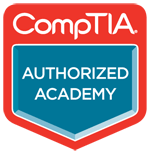CompTIA certifications are widely recognised as the leading vendor-neutral IT certifications worldwide. Accredited on the QCF, they can be taken alongside BTEC Level 2 First and BTEC Level 3 National IT qualifications. Click on the unit name below for the unit specification.
BTEC Nationals Information Technology (2010)
Vendor certifications
Vendor certifications are an important part of the BTEC Firsts and Nationals in IT, as well as the Higher Nationals in Computing and Systems Development. Find out more about them here.
Vendor certifications are an invaluable addition to BTEC qualifications, as they give learners the skills they need to progress as an IT professional. Employers often regard vendor certifications as the industry standard, and they’re much sought after by learners seeking employment and by professionals already working in IT and telecoms.
Vendor certifications are offered by major technology vendors or trade associations such as Microsoft, Cisco, VMWare, CompTIA, Oracle and Linux Professional Institute.
The table below shows which vendors offer certifications and at what levels:
| Vendor | Level 2 | Level 3 | Level 4 | Level 5 |
|---|---|---|---|---|
| Cisco | ✔ | ✔ | ✔ | |
| CompTIA | ✔ | ✔ | ||
| Linux | ✔ | |||
| Microsoft | ✔ | ✔ | ✔ | ✔ |
| Oracle | ✔ | |||
| VM Ware | ✔ |
Vendor certificates are an invaluable addition to the BTEC qualifications, as they help learners progress with their education and provide the right skills for them to find employment as an IT professional. Funding can be drawn down for the teaching and learning of the BTEC units.
Many of the learning outcomes for these units are covered in the BTEC optional units, so you can start teaching the course before deciding whether students should complete the internal assessment and/or be entered for the vendor certification.
BTEC vendor units are assessed by the vendor through external tests. Learners are awarded a pass or fail, and additional assessment criteria can be covered in order for them to achieve a merit or a distinction grade for the equivalent BTEC IT unit. You can find guidance on the learning outcomes for these units on the course materials page.
The individual vendors can give you further details on how their certifications are assessed and the fees involved. Please note that most vendors charge a fee to join their academy programme as well as a test fee, and discounts are often available.
There are restrictions on the maximum number of credits available for vendor certificates. For full details, see the specification. For instance, the BTEC Level 3 National Subsidiary Diploma (roughly equivalent to an A level) is 60 credits, of which no more than 20 credits can be used on optional vendor credits. The Oracle: Database Design and Programming with SQL unit is 10 credits.
CompTIA vendor certificates

| Level 2 | Level 3 |
|---|---|
| A+ Essentials A+ Practical Application |
The CompTIA Authorized Academy Membership Programme (CAPP ACADEMY)
Designed specifically for schools, colleges, universities, charities and other government-funded training organisations, the CAPP Academy provides you with the resources and support needed to help train and certify your learners, either for their career or to further their studies.
Cisco Academy
Cisco Academy’s CCNA provision is now on version 5.
BTEC units 105, 106, 107 and 108 will continue to link to the Cisco Exploration pathway.
In the transition to CCNA version 5, the Cisco Discovery pathway has been removed. Therefore, the BTEC units 101, 102, 103 and 104, which formed the Cisco Discovery pathway, are no longer available.
The new version 5 provision still aligns with the current QCF Exploration pathway units. In particular:
- Introduction to Networks maps to BTEC Unit 105
- Routing and Switching Essentials broadly maps to BTEC Unit 106
- Scaling Networks maps to BTEC Unit 107
- Connecting Networks broadly maps to BTEC Unit 108.
In version 5 of the Cisco CCNA provision, content on NAT/DHCP and ACLs has been moved from the fourth to the second component. However, in the BTEC National in IT, these topics are still covered in Unit 108: CCNA Accessing the WAN. This should not cause a problem to learners as they will have already covered these topics earlier in the Cisco course and can refresh their knowledge and understanding before taking the assessment required for BTEC Unit 108.
For example, in BTEC Unit 108, M1 assesses content on address management (such as DHCP and NAT), which is covered earlier in version 5 of the Cisco provision at the same time as learners are undertaking BTEC Unit 106 ‘Routing and Switching Essentials’. Learners will not be assessed on these topics as part of the BTEC qualification at this point. Instead, when they undertake Unit 108, they’ll need to refresh these topics before undertaking the assessment.
As we develop the next generation suite of BTEC Nationals in IT, we will amend the Cisco IT vendor units according to the latest Cisco provision.